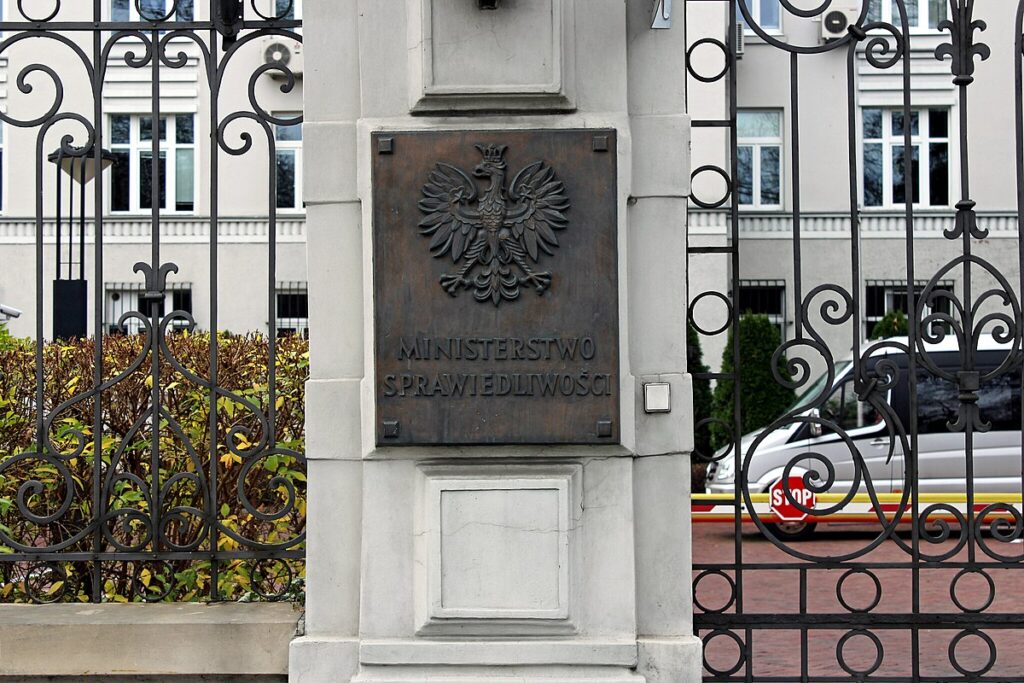- Minister Bodnar is once again interfering in the justice system without legal grounds.
- This time, he is inciting a retired judge to continue adjudicating despite the lack of consent from the National Council of the Judiciary.
At its meeting on 21 May 2025, the National Council of the Judiciary (a constitutional body whose purpose is to safeguard the independence of the courts and the independence of judges) adopted a resolution authorising the President of the National Council of the Judiciary to notify law enforcement authorities of a possible criminal offence. The crime was allegedly committed by Judge Małgorzata Kosicka, delegated to perform administrative duties at the Ministry of Justice, and other unidentified persons employed at the Ministry of Justice, as well as employees of the District Court in Konin.
In the case of the people employed at the Ministry of Justice, the offence has been described as inciting Andrzej Szaszkowski, a retired judge of the District Court in Konin, to commit a crime referred to in Article 231 § 1 of the Penal Code, which states that a public official who, exceeding his powers or failing to fulfil his duties, acts to the detriment of public or private interests, shall be subject to imprisonment for up to 3 years. In the case of court employees, the charge is direct commission of this very same offence. But what exactly did constitute this exceeding of powers?
At the end of 2023, Judge Andrzej Szaszkowski was approaching the age of 65 and thus age of retirement, pursuant to Article 69 § 1 of the Law on the System of Courts of General Jurisdiction. This retirement takes place by operation of law, regardless of the will of the judge, who may only request the National Council of the Judiciary to grant consent that a judge continue to hold his/her office. Pursuant to § 1b of this provision, the National Council of the Judiciary may grant consent only if there are special reasons for doing so, i.e. if:
it is justified by the interests of justice or an important social interest, in particular if it is justified by the rational use of the personnel of the common courts or by the needs arising from the workload of individual courts.
The resolution of the National Council of the Judiciary on granting or refusing consent is final and may only be appealed to the Supreme Court, in accordance with Article 73 § 2 of the Law on the System of Courts of General Jurisdiction. Pursuant to Article 26 § 1(3) of the Act on the Supreme Court, the Extraordinary Review and Public Affairs Chamber of the Polish Supreme Court is competent to hear such appeals.
In the case in question, on 8 September 2023, the National Council of the Judiciary issued Resolution No. 779/2023, in which it refused to grant consent for the judge to continue to perform his duties. After an appeal against the resolution, the case was finally decided by a judgment of the Supreme Court of 24 July 2024, ref. no. I NKRS 97/23. In its judgment, the Supreme Court emphasised that:
the statutory structure […] indicates the legislator’s preference for a “generational” replacement of personnel.
– thus acknowledging, that the lack of consent to postpone retirement was, in the legislator’s intention, a default option, from which it would only be possible to deviate in exceptional circumstances.
A copy of the Supreme Court’s ruling was delivered to the National Council of the Judiciary on 4 September 2024, which should have ended the proceedings on the further occupation of the position, and from that date the judge should have retired. It would seem that nothing in this regard should raise any doubts.
However, the Ministry of Justice unexpectedly decided to intervene in the case, acting – as has unfortunately become the sad norm in recent times, which we have described many times – without any legal basis.
Judge Dagmara Pawełczyk-Woicka, chair of the National Council of the Judiciary, revealed on 20 May this year in her post on the X platform a bizarre letter sent on 14 March 2025 by Judge Małgorzata Kosicka of the Regional Court for Warsaw-Praga in Warsaw, delegated to perform administrative duties at the Ministry of Justice and acting as deputy director of the Department of Human Resources and Organisation of Courts of General Jurisdiction and Military Courts, to Judge Andrzej Szaszkowski.
In this letter, the Ministry asks the judge to submit a statement to the Ministry:
whether he wishes to retire (and on what date) or whether he intends to remain in office as a judge.
The Ministry justifies this position by arguing that the proceedings concerning the judge’s continued tenure have allegedly not been completed, as the judgment in this case was handed down by the Extraordinary Review and Public Affairs Chamber of the Polish Supreme Court, which, according to the Ministry, is not a court due to the case law of the Court of Justice of the European Union, since all its members were appointed by the President of the Republic of Poland on the basis of resolutions of the ‘incorrectly constituted’ National Council of the Judiciary.
Two issues should be emphasised here. Firstly, the only body authorised to grant consent for a judge who has reached the age at which the law requires them to retire to continue to adjudicate is the National Council of the Judiciary. Submitting any statements in this regard to the Ministry will have no legal effect.
Secondly, as we have repeatedly emphasised on our website, the Court of Justice of the European Union has no power to determine what constitutes a court under Polish national law or to determine what procedure for appointing members of the National Council of the Judiciary is compatible with the Polish Constitution. The only body competent to rule on this matter is the Constitutional Tribunal, which, in its judgment of 25 March 2019 (ref. no. K 12/18) unequivocally and definitively stated that the current method of selecting members of the National Council of the Judiciary who are judges by the Sejm of the Republic of Poland is in line with the Constitution.
The Ministry’s suggestion to Judge Szaszkowski that he did not retire and could therefore adjudicate in cases leads to two further dangerous consequences. Firstly, if the judge is actually allowed to adjudicate, this will result in the incorrect composition of the court and the issuance of court rulings – judgments and decisions – by an unauthorised person. It should be noted here that, pursuant to Article 379(4) of the Code of Civil Procedure, proceedings are invalid if the composition of the adjudicating court was contrary to the provisions of law. This means that judgments issued by panels including a judge who has retired by operation of law should always be, pursuant to Article 378 § 1 of the Code of Civil Procedure, ex officio set aside. Analogous provisions apply in criminal proceedings – pursuant to Article 439 § 1(1) of the Code of Criminal Procedure, the court of appeal shall set aside the contested decision ex officio if an unauthorised person participated in its issuance – on the basis of which, incidentally, the Supreme Court issued its judgment of 7 September 2024 (file ref. III KK 385/24), which explicitly stated that these provisions apply to decisions issued by a panel of judges which includes a judge who has retired by operation of law.
On the other hand, the Ministry’s treatment of Judge Szaszkowski as not being retired results in him being paid his full salary, contrary to the provision of Article 100 § 2 of the Law on the System of Courts of General Jurisdiction, according to which a judge who retires due to age is entitled to a salary of 75% of his remuneration.
In view of the above, it is necessary to agree with the position of the National Council of the Judiciary that in the above case there has been a violation of public and private interests, consisting in exposing citizens to the prolongation of court proceedings and exposing the State Treasury to unjustified expenses.
Source of illustration: Wikipedia.



